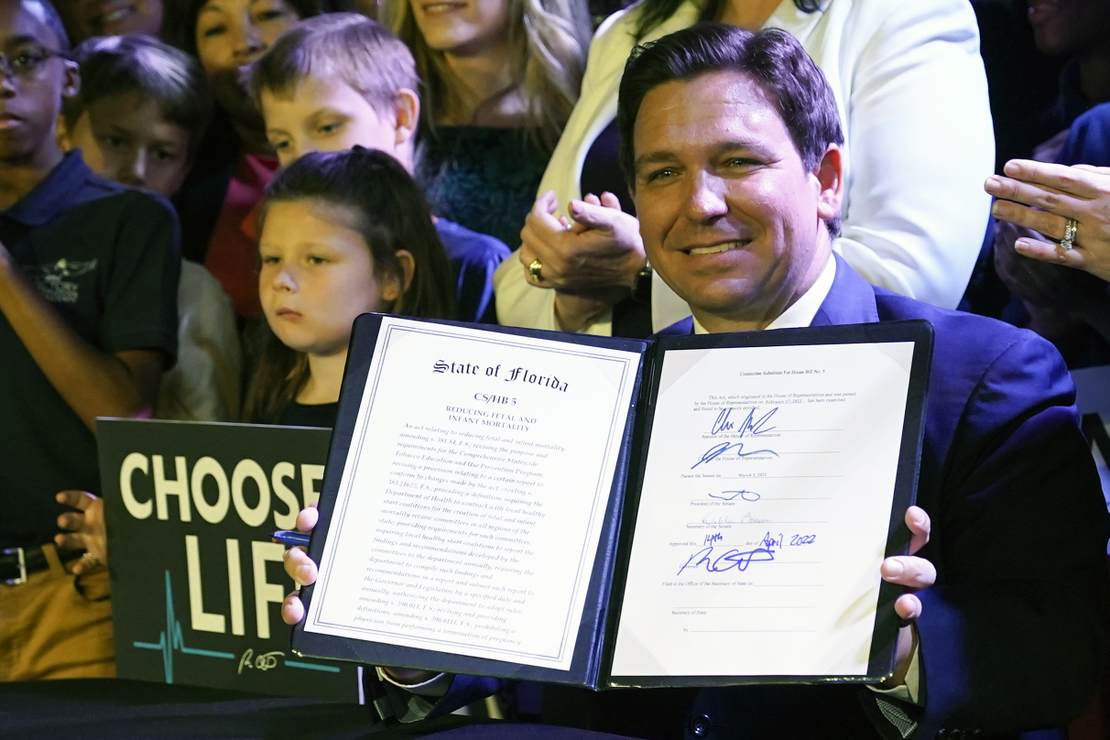
A Florida law banning abortions after 15 weeks of pregnancy was to take effect today but a judge has temporarily blocked it. Judge John C. Cooper of the Second Judicial Circuit Court in Tallahassee handed down his ruling on Thursday.
Judge Cooper handed pro-abortion supporters a victory, though likely only a temporary one, and a setback for Governor DeSantis. DeSantis signed the abortion ban in April. Since the Supreme Court ruling in the Dobbs v Jackson Women’s Health case, abortion law has been returned to states, as it was before 1973. Abortion is still legal in the United States, despite the hysterical claims heard from abortion supporters. Many states with abortion bans are now in court battles. This will be the new normal for a while. In Florida, Judge Cooper ruled Florida’s law violates privacy protections in the State Constitution. There is a catch, though.
But in a complication emblematic of the chaotic past week of legal and legislative action in the wake of the Supreme Court’s decision, the temporary statewide injunction Judge Cooper issued from the bench will not be binding until he signs a written order. The delay will leave Florida’s 15-week ban in place for a short time — perhaps a few days, because of the Fourth of July holiday — until the paperwork is completed.
Through Thursday, Florida allowed abortions until 24 weeks of pregnancy, making the state a refuge for women seeking the procedure from across Southeastern states with tighter restrictions. More than 79,000 abortions were performed in Florida last year.
Still, even once Judge Cooper’s ruling kicks in, it is expected to be fleeting: The state said on Thursday it would appeal, and the judge acknowledged that the appellate court was unlikely to keep his temporary pause in place for very long.
The judge and pro-abortion Floridians know it is a losing battle, they are just trying to buy some time. They are making a political statement even though they are on the losing side of the argument. Trigger laws that have been passed in thirteen states are being legally challenged after the Supreme Court ruling allows them to begin to go into effect. Earlier this week I wrote about a Harris County (Houston) District Court judge who granted a temporary restraining order that blocks an abortion ban. Confusion about state laws will be the norm for the near future.
Similar legal fights are playing out in other states, where various plaintiffs are arguing that their own state constitutions provide specific protections for abortion. On Thursday, a judge in Kentucky temporarily blocked an abortion ban that was triggered by the Supreme Court’s decision. That law, passed in 2019, called for a near total ban on the procedure and had already led clinics to turn patients away.
As in Florida, lawyers for the plaintiffs argued that Kentucky’s Constitution protects the right to an abortion. Ultimately, however, the court fight in Kentucky could be short-lived. In November, voters there will consider a measure establishing that there is no state constitutional right to abortion.
READ RELATED: Trans woman on what she wishes she'd known before having surgery at 19
The Supreme Court ruled on Thursday that Arizona can enforce a ban on abortions performed because the baby has a genetic abnormality such as Down syndrome. This ruling allows enforcement of a 2021 Arizona law. Prosecutors can bring felony charges against doctors who knowingly terminate such pregnancies. There will be no immediate effect from this ruling because Arizona abortion providers stopped all abortions following last Friday’s Supreme Court ruling in the Dobbs case.
In Thursday’s genetic abnormality ruling, the Supreme Court sent the case back to the federal judge in Phoenix who had blocked it last September. U.S. District Judge Douglas Rayes said in his ruling that the law’s criminal provisions were likely unconstitutionally vague, explaining it’s unclear at what point in the process doctors can be deemed to be aware that fetal genetic abnormality exists.
There is a kerfuffle brewing between Governor Ducey and Attorney General Mark Brnovich, both Republicans. Ducey is not running for re-election.
Providers, including Planned Parenthood Arizona, stopped performing abortions immediately because they were worried about a pre-statehood law making it a crime to perform an abortion or assist in any way, unless the life of the mother is threatened. It was unclear if that law could be enforced, but Republican Attorney General Mark Brnovich said Wednesday that it can be.
That decision puts him at odds with GOP Gov. Doug Ducey, who has repeatedly said that a ban on abortions after 15 weeks’ pregnancy that he signed in March takes precedence. His spokesman, C.J. Karamargin, said Wednesday night that the governor’s office is reviewing that decision and had no immediate comment.
The 2021 law specifically said it did not overturn the total abortion ban in place since at least 11 years before Arizona became a state in 1912. The Republican-controlled Legislature did remove another part of that law allowing women to be sentenced to one to five years in prison if convicted of having an abortion.
We’ll have to wait and see if the original state law remains in place over the 2021 law in Arizona.
Source:






